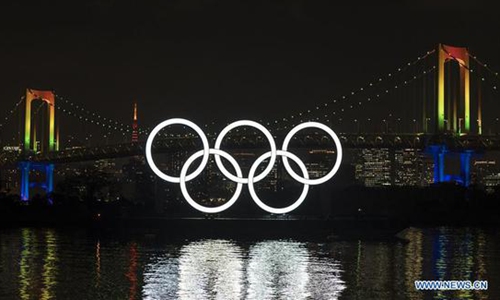HOME >> SPORTS
Postponing Tokyo Olympics would be a more reasonable choice for all
By Lu Wenao Source:Globaltimes.cn Published: 2020/3/18 4:34:04

Olympic rings are illuminated during an event to mark six months before the opening of the Tokyo 2020 Olympic Games in Tokyo, Japan, on Jan. 24, 2020. (Photo:Xinhua)
Though the International Olympic Committee reiterated Tuesday that the Tokyo Olympics will go ahead and there is no need for any drastic decisions at this stage, do we really need an Olympics when things are far from settling down?
Even if the coronavirus pandemic is under control by July 24, the date for the Olympics' opening ceremony, athletes - the core of Olympics - might not be ready.
The coronavirus spread has meant many athletes around the world are unable to train and compete as usual, as several test events as well as qualifiers for the Olympics have been canceled. In such circumstances, how can we make sure that athletes are in their peak form for the Tokyo Olympic Games (July 24-August 16)?
What's more, the safety of fans, indispensable for any major sporting events, cannot be fully guaranteed. Suggestions have been made that the Olympics can be held without fans, but the empty stands would of course downgrade the glamour of the Games.
That's why playing games behind closed doors is often seen as a punishment for teams that violate certain rules instead of a must-do measure during the pandemic.
And even playing behind closed doors is not always safe. Spanish La Liga side Valencia played a European Champions League game in Milan in February, now around 35 percent of their first-team players have tested positive for the virus.
Both the European Championship and Copa America, soccer's top intra-continental championships in 2020, have been postponed for a year amid the coronavirus spread.
The Olympics, the supreme magnet for sports fans, often draw tens of thousands of fans. How could Japan ensure, even if the world got the pandemic under control by July, the Games are 100 percent safe?
Even China, which imposed the most drastic measures to curb the virus spread, cannot put a stop on imported cases lately, though domestic cases are no longer growing rapidly.
The IOC has said the decision to maintain the Tokyo Games as scheduled is not "determined by financial interests," but in this highly market-oriented sports world, how can the IOC say its decision is not based on financial interests?
Take a look at the schedule of the Olympic swimming competitions. Plenty of swimming finals are to be held in the morning and heats at night rather than traditionally in reverse when local fans enjoy the most exciting moments at night.
The reason for the schedule is simple. The IOC is satisfying its big contributors from the other side of the globe: its major broadcaster NBC, which paid the IOC the highest amount for broadcast rights in the US, along with half of the Olympics' 14 top sponsors, are all from the United States.
Mankind can defeat the coronavirus, that is for sure, but we really do not need to prove that by holding the Games as Japanese Prime Minister Shinzo Abe told G7 leaders on Tuesday, let alone it is highly likely to be a risky event.
The Olympics' successful history through last century saw it overcame the 1918 influenza impact, with only three cancelations due to World War II, including a Tokyo Olympics in 1940. But now, times have changed.
Cancelation of another Tokyo Olympics will be unfair and disastrous for Japan, but a postponement will make the Games prosper. The sports world also wants to see a stimulant under current conditions.
Protecting people's health should always be the priority. Sports can wait, cash is not the king!
Posted in: OLYMPICS,EXTRA TIME